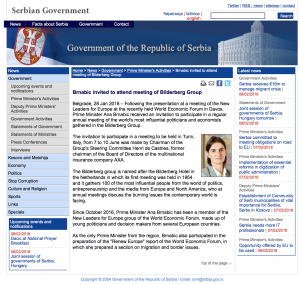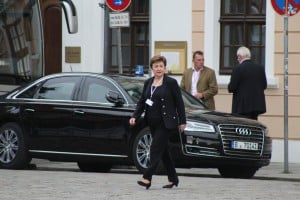
UPDATE: The Bilderberg Media Service responded on Feb. 13 with the following statement: “Kindly note that we do not confirm the date and venue of this year’s Bilderberg meeting at this stage. As in previous years, we will publish a press release including the date and location, the discussed topics as well as a list of participants on our website in due course before the next meeting.”
Months ahead of schedule, a location and date for the 2018 Bilderberg Conference have been announced in an apparent leak from an unexpected source — the nominally pro-western government of Serbia. The timing of the announcement, however, coincides with a moment in which western institutions are taking renewed interest in the Balkans.

Following Serbian Prime Minister Ana Brnabic’s appearance last month at the World Economic Forum (WEF) in Davos, Switzerland, Belgrade announced Brnabic had been invited to attend the 2018 Bilderberg Conference. The conference is scheduled for June 7-10 in Turin, Italy, according to a Serbian government press release.
The Bilderberg Group is an organization of primarily European and North American elites from business and politics. Bilderberg conferences take place annually at hotels or resorts in Europe or North America, often in early June. The meetings are closed to the public, and members of the press who are invited to attend do not report on the conferences.
Critics of Bilderberg have alleged the group secretly influences government decisions and even planned the creation of the European Union and the euro currency. Additionally, the Bilderberg Group has a reputation among some of its critics as a body of kingmakers that catapults certain conference attendees up the political ladders of their respective countries.
RELATED: WHAT IS THE BILDERBERG GROUP?
On Jan. 28, the Serbian government issued a press release stating Bilderberg Steering Committee Chairman Henri de Castries invited Brnabic to attend the group’s 2018 conference after a presentation given during a meeting of the New Leaders for Europe group at the WEF in Davos. Brnabic has been a member of the WEF’s New Leaders for Europe group since Oct. 2016, according to Belgrade’s news release. The group consists of young politicians and decision-makers from several European countries.
Bilderberg has not confirmed the date and location of its 2018 conference, and it has yet to release any information about the meeting. The group does not typically divulge its meeting date and location until well into springtime.
Belgrade’s announcement has prompted some observers to raise questions as to whether the date and location disclosed could be misinformation. However, many observers also expect the Bilderberg Group to meet in Europe this year, as the organization follows a loose schedule of meeting once every four years in North America and otherwise convening in Europe.
Last year, the group held its official meeting in Chantilly, Virigina, as it had done in 2012 and 2008. Bilderberg previously met in Italy in 2004, 1987, 1965 and 1957.
An email sent to the Bilderberg press address asking to confirm the location and date of the 2018 conference was not returned.
Who Is Brnabic?
Last June, Brnabic became Serbian prime minister after Aleksandar Vucic shifted from being premier to president of Serbia. Vucic selected Brnabic as his successor, a surprise to many people, as she is an openly gay woman.
Brnabic became both the first female and first homosexual to serve as prime minister of Serbia, a country that is predominantly Orthodox Christian and fairly conservative by European standards. A few months later, Brnabic became the first Serbian prime minister to participate in a gay pride parade.
Prior to becoming prime minister, Brnabic served for less than a year as Serbia’s minister of public administration and local government. Previously, she worked with various international organizations and foreign investors, including on U.S. Agency for International Development (USAID) projects in Serbia. Brnabic also holds a master’s degree from Hull University in the United Kingdom.
Although Brnabic serves as head of government, power in Serbia is still concentrated primarily in the hands of Vucic, who head Serbia’s ruling Progressive Party and is known to have a stranglehold over the country’s mainstream media. Many observers view Brnabic as merely a figurehead prime minister, put in place by Vucic to appease western officials.
Vucic, who began his career as a nationalist politician working under Slobodan Milosevic, has in recent years maintained a balancing act between the West and Russia. Under Vucic’s leadership, Serbia’s stated goal is to join the European Union. However, Belgrade remains militarily neutral, and Vucic often visits Moscow for purposes including securing Russian arms shipments. Even though Serbia, along with Montenegro, is slated as next in line to join the EU, much of the country holds a lukewarm view of the EU while holding a favorable view of Russia.
Still, days after Brnabic took over as prime minister, the Serbian government established a ministry of EU integration. The Brnabic-led government also created a ministry of environmental protection.
Bilderberg and the Balkans
According to the official Bilderberg website, the breakup of Yugoslavia was featured as a common topic during conferences in the 1990s. The year 2000 was the last time in which the Balkans was an official topic at a Bilderberg meeting. That year, as the Yugoslav wars were coming to an end, Bilderberg attendees discussed “cleaning up the Balkans,” according to the group’s website.
A press release apparently issued at the conclusion of the 2000 conference states Carl Bildt, the former Swedish prime minister and then-UN envoy for the Balkans, attended the gathering, as did Franco Bernabe, a Bilderberg insider and then-Italy’s special representative for reconstruction in the Balkans. The conference also included one participant from a Balkan state, then-newspaper publisher Veton Surroi of Kosovo, according to the news release circulating on the internet.
European participants at Bilderberg conferences primarily come from western, northern and southern Europe. The conferences do not draw many participants from Eastern Europe or the Balkans.

The last Bilderberg attendee from a Balkan country was Kristalina Georgieva of Bulgaria in 2016. However, Georgieva attended Bilderberg in the capacity of her then-position as a European commissioner. Georgieva emerged from the 2016 conference as an unannounced candidate for UN Secretary General backed by western political elites. After launching a failed campaign for UN boss, Georgieva later went on to become CEO of the World Bank.
High-ranking EU and NATO officials are often in attendance at Bilderberg conferences. NATO Secretary General Jens Stoltenberg attended last year’s conference in Chantilly, Virginia.
After years of placing little focus on the Balkans, western political elites are paying more attention to the region. Brnabic’s apparent invitation to attend Bilderberg coincides with a push by the EU and NATO to reel in the Western Balkans.
It is unclear whether anything related to the Balkans will appear on the 2018 Bilderberg agenda. The Bilderberg Group tends to release an agenda, or topics list, days before its conferences begin. However, the topics are often vague, and it is unknown whether the group sticks to the publicly released agenda.
In the current political makeup of the Western Balkans, Croatia, Montenegro and Albania are members of NATO, while Macedonia, Bosnia and Serbia are not. Partially recognized Kosovo is not a NATO member either, though the military alliance leads an international peacekeeping force in Kosovo and has several thousand troops stationed there.
Croatia is the only Western Balkan state that is currently a member of the EU. However, Brussels has identified the Western Balkans as its next area of expansion, and amid Brexit negotiations, the EU is eager to show that it is growing, not shrinking.
Just this week, the European Commission released its strategy for enlargement in the Western Balkans. The strategy identifies Montenegro and Serbia as the next two countries in line to join the EU, and it sets 2025 as a target date for their accession to the bloc.
Brussels is paying particularly close attention to the Western Balkans over the first half of 2018, largely because that is the span of the Bulgarian presidency of the European Council. Bulgaria is using its control of the rotating EU presidency to push for faster EU integration in the region. An EU summit on the Western Balkans is set for May 17 in Sofia, just a few weeks before the Bilderberg conference.
The integration of the region into the EU and NATO could also receive a jolt from the recent leadership change in Macedonia. In recent years, the EU applied political pressure on the government of the nominally pro-western ex-prime minister of Macedonia, Nikola Gruevski. Meanwhile, Brussels lent seemingly overt support to then-opposition leader Zoran Zaev. In 2017, Gruevski’s party was ousted from power, and Zaev became prime minister.
Since taking over as Macedonia’s prime minister, Zaev has engaged in talks with the Greek government about resolving the decades-long name dispute. Athens refuses to recognize Macedonia as the name of its northern neighbor’s country, arguing it amounts to a cultural claim to the Greek region of Macedonia. It appears the two sides are nearing a compromise, with Zaev offering to rename his country something like “North Macedonia” or “New Macedonia.”
If the Macedonia name dispute gets resolved, Greece will drop its veto of Macedonian NATO and EU membership. Then Macedonia could quickly join NATO. That would effectively leave just Serbia and Bosnia outside of NATO, and they would be surrounded by member states of the alliance.
Macedonia is still years away from EU membership, but with a cozy relationship between Brussels and the current government in Skopje, the process could speed up.
All of the potential EU expansion in the region, at least for now, hinges on the countries resolving their various border disputes. That includes Serbia and Kosovo reaching a “comprehensive, legally binding normalization agreement,” the European Commission strategy paper states.
Brussels has not made it clear whether or not it will demand that Serbia recognize Kosovo’s independence in order to join the EU. Brnabic has said Serbia maintains its stance that Kosovo is part of Serbia and she does not think Serbia can ever recognize Kosovo’s independence. However, Brnabic has also said Belgrade is trying to be flexible and pragmatic and does not want to leave the issue for future generations to resolve.
The EU and NATO find themselves in a bit of a race to integrate the Western Balkans, as other countries, particularly Russia, have been jockeying for influence in the region.
In addition to delivering weapons, Russia provides political support to Serbia, largely over the Kosovo issue. There has also been a proliferation of Russian and pro-Russian media in the Western Balkans, which has been credited in part with swinging sentiments in Serbia in the direction of Moscow.
RELATED: OBSCURE PHILOSOPHY MAKES INROADS AT THE KREMLIN, WHITE HOUSE AND BILDERBERG
In Macedonia, Moscow backed the ex-Gruevski government that promoted nationalist policies and, like Serbia, refused to join western sanctions on Russia.
Likewise in defiance of the West, Moscow supports Bosnian Serb leader Milorad Dodik, who has repeatedly threatened the secession of his Serb-dominated statelet from the country of Bosnia.
Russia has a stated policy of opposing further NATO expansion in the region, and western officials allege Moscow has gone as far as organizing a coup attempt in Montenegro to put a halt to expansion of the alliance. Moscow denies the allegation that it was involved in the murky events that took place during the 2016 Montenegrin election, which resulted in the arrests of about 20 Serbian nationalists.
Last year, one of Bilderberg’s official topics was “Russia in the international order.” Perhaps in 2018, formally or informally, Bilderberg will discuss Russia’s clash with the western-established order in the Balkans.
